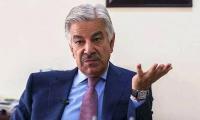QUETTA: Chief Justice of Pakistan Mian Saqib Nisar on Monday questioned why the chief secretary and inspector general police (IGP) of deployed in Balochistan are non-locals. Hearing different cases and addressing ceremonies in Quetta, the chief justice said injustice with Balochistan will never be allowed.
Addressing a ceremony in Quetta, the chief justice said, “Three months ago, we increased the number of judges in high courts and made it nine plus one instead of six plus one. The representation of Balochistan in the Islamabad High Court is inevitable.”
Stating that institutions are not affected by who is in charge at a given time, Justice Nisar said, “It does not matter whether someone stays or not and whether I remain or not, the institution that is the Supreme Court will remain. The people who will come after me are better than me.”
Speaking about his campaign to raise funds for the construction of Diamer-Bhasha and Mohmand dams, the chief justice said, “Dams have become indispensable for our future generations. For God’s sake love this country, give one year to this country and see what it becomes. We will leave a precious gift for the future generations.”
Further, Justice Saqib Nisar said, “It is our responsibility to correct ourselves and look inwards to fix our faults.”
Urging the nation to love “Quaid-i-Azam’s Pakistan”, the top judge questioned, “What are the reasons that today after 40 years we are thinking that water will be extremely precious in Balochistan after seven years. Did people not know how significantly the water level has been dropping in the province?”
Questioning what measures were taken in light of the significant drop in water level in Balochistan, the chief justice said, “No one will hold these people accountable. Now is the time to give back to the country and people should come forward.”
Further, the chief justice shared that Balochistan High Court judges and staff handed him a cheque of donation for the dam fund.
Earlier in the day, the chief justice inaugurated the newly constructed building of the Supreme Court Registry in Quetta.
Speaking on the occasion, the chief justice said the project has been completed as a result of collective efforts of the concerned officials and engineers. “I pray that this building plays a role in delivering justice to the people,” he added.
Justice Saqib Nisar noted that institutions are not defined by buildings but by the people that work there. “Societies are formed on the basis of justice,” the top judge further said.
A three-member SC bench headed by the chief justice and comprising Justice Asif Saeed Khosa and Justice Gulzar Ahmed marked the occasion by hearing a case regarding the blockades placed on Zarghun Road in the provincial capital.
“You have ordered the removal of blockades from roads all over the country,” observed lawyer Nazeer Agha, before informing the top judge that Quetta’s Zarghun Road still remains blocked under the pretext of being in the Red Zone.
At this, Justice Nisar instructed the advocate general to summon Balochistan’s chief secretary to appear before the court, remarking that “roads are not blocked anywhere in the world for the sake of security.” However, a formal notice to summon the official was not issued. The chief justice also heard cases regarding scarcity of water in Balochistan.
Market insiders fear that inaction by government would seriously hurt interest of consumers
Through order, election commission had directed petitioner and defence to complete their arguments on April 22
AAG said that names have been removed from ECL as per court order
Ambassador Naqvi warned that proliferation of emerging technologies threatens to destabilise global security order
Youth in Punjab are being empowered through education, IT training, internships and employment, says Kakar
Pakistan-Russia Joint Working Group to Counter International Terrorism







